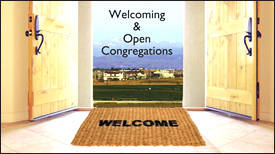Talk by Malcolm Macourt at the Church of Ireland Tripartite Diocesan (Limerick, Clogher, Tuam) discussion on sexuality held in Claremorris, County Mayo on 15th February 2014.
For all my working life as an academic – and since I retired – I have lived ‘across the water’, maintaining close links with family in Ireland, north and south, reading the Church of Ireland Gazette weekly, and visiting the island many times each year.
For the last 35 years my partner has been an ordained Anglican priest working – until he retired – in the parish ministry. For the last 30 years we have regarded ourselves as being in a loving partnership. We both continue to work at that partnership and we both believe that it enhances our ability to be conscientious, caring, people working in a Christian context in ministry, in education and in the world.
Anglicans believe that the Church is called to interpret the gospel afresh for every age and culture, and this we do by revering scripture, taking careful account of church tradition over two millennia, applying reason and operating within our own consciences under God.
The practical issue seems to be whether lay people and clergy can be involved in same-sex partnerships, and whether the church should acknowledge, endorse and bless such relationships.
I have been involved in gay-related organisations and groups for 40 years, both church-related and otherwise. In that time I have been privileged to have made a number of contributions to public debate including two books, a number of articles including those relating to a major British government-funded programme on men’s same-sex activity, and various appearances on radio and television. I have watched many changes in the ways that various parts of society deal with same-sex relationships – and for the most part I welcome those changes.
I believe that we, the Church, should do all we can to create an environment where people can fulfil a fundamental commandment – to love one another. Loving should be refreshing and enlivening, it should be enjoyable, and it should be for a purpose. That purpose is to enable us to love God and serve our fellow humans better. For many people in many relationships part of that service is bringing up children.
So what is the problem about same-sex relationships? Surely it can’t be the tiny handful of obscure verses in the Bible. These verses do not relate to those who understand that a same-sex relationship is what is appropriate for them; these verses do not relate to those who have turned away from an existing marriage partner; these verses do not relate to those who have an obsession with sex.
Perhaps the problem is that parts of the church haven’t taken the time to look carefully at what we mean by relationships, by marriage. The context for relationships has changed dramatically in the last fifty years. Three features come immediately to mind.
1. Most women expect to have opportunities for education, employment and a career with decisions to make just as their men friends do. For some women (and not a few men) their career plans may include a long or short time nurturing children.
2. In England these days about half of all births are ‘born out of wedlock’. This is a major change – thirty-five years ago that figure was only one-in-twelve. Unlike fifty years ago, almost all of those children have both of their parents’ names on their birth certificates. Some clergy have faced the reality that baptism does not always come after marriage, sometimes it comes at the same church service and often the parents do not get married at all.
3. The arrival of the contraceptive pill separated in the minds of successive generations of young people – rightly or wrongly – hetero-sexual intercourse into two types: that for pleasure and that for the possible production of a baby. Whatever the official views of the Roman Catholic Church during the last 40 years, and whatever the legal position of the contraceptive pill in Ireland (North and South), the mindset of successive generations has changed. Accidental pregnancy is to be avoided just as sexually transmitted diseases are to be avoided.
Caring for another – giving your life to another – wanting to develop your life together with another is a fundamental need. The bible contains very many examples of people coming together in love so that together they can better serve their people and God. Many of them in what we now interpret as married relationships, others in different contexts such as Ruth and Naomi, David and Jonathan.
The churches have been faced with the challenge of deciding – both individual congregations and ‘official’ church bodies. Will churches encourage loving, caring relationships, and seek to help those involved find and serve God and the community? Will churches insist that the only relationships to be endorsed are those where one fertile man and one pre-menopausal and fertile woman get married with the intention of producing at least one child? In practice many Christians choose the first – they encourage and endorse caring relationships where they see them.
Relationships can be destructive of one or all the parties concerned – they can be damaging for children and for those others around. Sexual activity can be a force which destroys a relationship, just as it can be a force which develops it. That is true whether the relationship is opposite-sex or same-sex.
Of course some sexual encounters are short-lived. A night out in Temple Bar is often the precursor of a one-night stand. Opposite-sex or same-sex, approved by prudes or not, one-night stands occur. In areas where there is racial bigotry couples of different races often have difficulty maintaining their relationships, whether opposite-sex or same-sex. Maintaining a relationship based solely on sex is difficult too; or one where there is no meeting of intellects. None of these relate to whether the sexual encounter is opposite-sex or same-sex.
But there are problems with same-sex relationships – additional to the problems which opposite sex relationships have – and they relate to the reaction of some people to same-sex relations. Fortunately in both the United Kingdom and in the Irish Republic many elements of discrimination have been legislated against, but legislation does not stop some people engaging in hate. The changes in the last 50 years have been dramatic. We have moved towards acknowledging that all people are equal in the sight of God and of the law, in gender, race, disability, and sexuality. That we have moved reluctantly has made life difficult for all sorts of people, but we have moved. That must be a sign of grace.
But what of the clergy? The Church claims that it expects them to live exemplary lives and seems to have the same expectation of their partners and their children too.
How realistic is that expectation? What constitutes an exemplary life must not be bound up in the details of local or national culture – it should relate to general principles derived from scripture and church tradition, moderated by reason and conscience. Should an incumbent’s partner automatically be an Anglican, involved in the church? Should our expectations be about personal attitude to self, to others, to God – or should they be bound up in matters of detailed practice? My expectation is that the partner should encourage and support the cleric in ministry – that support being expressed in whatever form is appropriate to the two people concerned and the environment of the ministry.
Nothing here relates to whether the relationship is opposite-sex or same-sex.
We have been together in two parishes. In the first parish the congregation got to know slowly over a period of time that we were together. It was an ordinary congregation of working people, including many involved in heavy industries – coal mining and engineering. The universal response was to recognise us as a couple with no sniggering or bitching or recourse to bible-bashing. It was a great experience that, after eight years – over twenty years ago – at the leaving ‘do’, in the presence of the Bishop, we were both given presents, and our parents – all four were then still alive and present for the occasion – were given bouquets of flowers.
In late 2005 we entered into civil partnership. A brief legal ceremony with our relatives in the Civic Centre was followed by a Eucharist of Thanksgiving for Friendship and Commitment in the neighbouring Church of St. Thomas the Martyr. Just to be sure the ruling body of the church were invited on three separate occasions to vote on whether the service should take place – and on each occasion there were no votes against.
The sermon was preached by the Bishop of Durham who was present at our leaving ‘do’ in 1992, his suffragan bishop conducted the prayers and the priest in charge of the church celebrated the Eucharist. There were 230 people present – and 150 of them, our invited guests, joined us for a celebratory meal in the Civic Centre after the service.
Unfortunately opposition to same-sex couples comes all too often from among alleged fellow Christians. By that I mean those people who proclaim that they are Christian, usually prefixed by the phrase ‘bible-believing’, and whose understanding of love (limited?) leads them to see it as their responsibility to engage in something of a witch-hunt.
Do clergy and their partners lead exemplary lives? On one matter I am very clear: just because the partner is of the same-sex does not automatically mean that the answer is NO. Are my partner and I leading an exemplary life? I cannot judge – that is for others – and God. I hope that I have encouraged and supported my partner in his ministry.
Most church people in same-sex relationships can distinguish between two types of church people – those who are caring, loving, accepting and encouraging and those who are antagonistic. However for very many young gay people the only experience they have of Christianity, apart from school, is of the noise of hatred. Most caring church people care without a lot of fuss. So how does the church fulfil its mission to go out into the entire world bringing good news?
Not by screaming abuse – and not even by having fixed smiles and expressing bizarre sentiments such as ‘loving the sinner but not the sin’. The response of most young gay men and young lesbian women to the church is not unlike that of their [non-gay] peers: to ignore it as, at best, irrelevant and, at worst, a curse. It would seem they have good reason – who wants to deal with those who delight in abusing you?
How do we – the church – change that perception?
By completing the change whereby we now regard women as equal to men, by reviewing the way we understand relationships, and by treating same-sex partners as human beings – some good, some bad – some whose example is to be emulated, others to be rejected.

